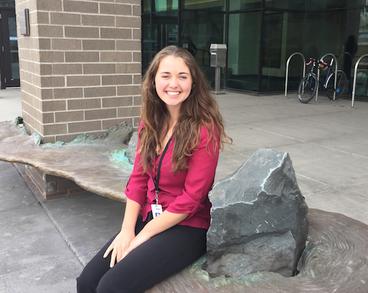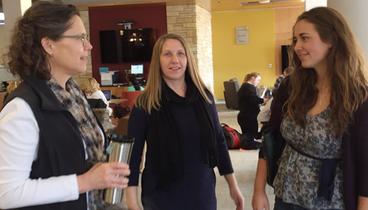UMD Prepares Child Welfare Scholars to Help Families in Crisis
The statistics are staggering. “Heroin use in St. Louis County has dramatically increased in just a few years,” Megan says.
A growing number of parents in Minnesota are addicted to heroin and that means Megan sees children who have suffered. Some children have been neglected or physically abused. Some babies were born in withdrawal.
St. Louis County Health and Human Services, where Megan interns, reports that substance abuse by parents is a major reason for children entering foster care. That is putting pressure on child-welfare systems and creating a desperate need for the child welfare program UMD has developed.
Child Welfare Scholars
Megan, a senior from Morris, Minn., is a UMD Child Welfare Scholar. That means she receives $3,000 each semester and takes special courses. Working as an intern is part of the deal. In return, Megan has made a two and a half year commitment to a career in the child welfare field.
There are 25 UMD Child Welfare Scholars at the bachelor's and master's levels and eight of them are interning this semester. “I'm proud of the social work program,” Megan says. “It's who I am. I am getting the skills and knowledge and education to really make a difference.”
The interns approach each case with a special skill set. “We support parents and look out for children's safety and well-being,” Megan said. “We help people make a plan and we offer lots of encouragement.”
Dawn Eckdahl, student support coordinator for the UMD Child Welfare Scholar program, emphasizes the need for active listening. “Much of a social worker's role is to listen effectively,” she says. “That leads to empathy and respect.”
Putting Skills into Practice
Megan says that listening helps her understand what people go through. Kicking a heroin habit is a lifelong battle. “I see how hard people struggle,” she says. “Yet, there is strength in the people we work with. We try and work with those strengths to build up parents.
Parents who have addiction issues, “have a limited time to prove they can care for their children and get them back,” Megan says. As soon as the child-protection agency files the case with the court, the clock starts ticking. The parent needs to get clean and stay clean for one year. Dawn echoes Megan’s concern. “It’s important to keep families intact. Children do better when they can be returned to their parents. Steady progress by the parents is especially important.”
“Helping parents is one area where UMD’s interns offer support,” Megan says. She gets needed guidance. “My field placement supervisor is so good, she helps me with the really tough issues.” The internship is a tough job. “I offer what I can. We can't be judgmental. I try to put myself in a client's shoes to see what it is like to walk their journey.”
Next Steps
UMD is pleased with the enrollment in the new bachelor's degree program, especially in the child welfare area. "We've offered the child welfare scholars program at the master's level for many years and we're thrilled to be able to offer it at the bachelor's level now," says Karen.
Megan is pleased too. She will graduate in May 2016 with a bachelors degree in social work and she moves straight into the Master in Social Work program, which will only take her 12 months to complete because she already has many of the requirements under her belt.
Megan may be around for quite some time. "I love the area," Megan says. "I’d love to work in St. Louis County. There's lots of opportunities for me here."
Find out more about UMD's Child Welfare Scholars program.


